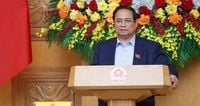On May 8, 2025, Prime Minister Pham Minh Chinh convened a pivotal meeting with the Policy Advisory Council to refine the draft resolution of the National Assembly regarding specific mechanisms and policies aimed at fostering private economic development. This initiative is part of the broader implementation of Resolution 68 issued by the Politburo, which emphasizes the need for a robust framework to support the private sector.
During the meeting, the Prime Minister underscored the urgency of institutionalizing the Politburo's Resolution and developing a corresponding National Assembly Resolution to facilitate rapid and sustainable growth in the private economy. He articulated that the contents within the "four strategic pillars" of this initiative are designed to create a positive synergy when implemented systematically and cohesively.
"The draft resolution must address the most pressing issues that both citizens and businesses are concerned about, combining urgent and long-term needs that have not yet been covered in existing draft laws," the Prime Minister stated. His call to action reflects a growing recognition of the challenges faced by the private sector and the necessity for timely governmental support.
The Prime Minister's remarks highlight the need for mechanisms and policies that act as a "lever and fulcrum," effectively utilizing all available resources to promote production, economic growth, and the creation of jobs and livelihoods for the populace. He emphasized that the development of the private economy should not be constrained, stating, "Innovation in private economic development is limitless, with the goal of a prosperous, democratic, and civilized nation in the new era."
To further bolster the private sector, the Prime Minister called for the establishment of mechanisms to alleviate existing difficulties and bottlenecks that hinder growth. He envisions a culture where entrepreneurship thrives, encouraging every individual and household to engage in legitimate business endeavors. "Policies must be robust enough to enable large economic groups to participate in global supply chains, evolving into multinational corporations," he noted.
The Prime Minister also stressed the importance of ensuring freedom of business, promoting fair and equal competition. He highlighted the necessity for human resource training to be aligned with market demands and enterprise development, advocating for a close partnership between businesses and educational institutions.
In his directive regarding the assignment of tasks to enterprises, he stated there should be no limitations on the fields or scales of projects. This flexibility is intended to empower businesses to adapt and innovate according to market conditions. Furthermore, he emphasized the need for enhanced mechanisms related to intangible assets, branding, and intellectual property, which are crucial for modern economic development.
As part of the broader economic strategy, the Prime Minister pointed out the need to refine policies regarding credit guarantees for small and medium enterprises, and to encourage private investment funds. He also called for the simplification of business registration procedures, ensuring that the process is as straightforward and cost-effective as possible.
The Prime Minister's vision for the private economy is ambitious, aiming to create a supportive environment that fosters growth and innovation. He insisted on the importance of quickly gathering feedback from the business community and presenting the draft resolution to the National Assembly for approval by May 18, 2025.
In a related development, the Ministry of Finance reported that the tasks and solutions outlined in Resolution 68 should be categorized into three groups. The first group includes urgent tasks requiring immediate action, while the second group consists of tasks that need to be amended within the scope of existing laws. The third group encompasses long-term orientation tasks that require further research and evaluation.
At the meeting, delegates engaged in discussions regarding specific policy groups within the draft resolution. Topics included principles for business inspections, streamlining bankruptcy procedures, and enhancing access to land in industrial zones. Delegates also expressed opinions on policies aimed at supporting housing rent and increasing capital for the private sector through the Small and Medium Enterprise Development Fund.
In addition, the Prime Minister called for policies that promote green financial transformation and improve the quality of human resources in the private sector. He emphasized the need to create a favorable environment for businesses to thrive, highlighting the importance of making it easier for small businesses to grow into larger entities.
As the meeting concluded, the Prime Minister reiterated the urgency of institutionalizing the Politburo's resolutions and developing a National Assembly resolution that reflects the needs of the private sector. His commitment to fostering a dynamic and resilient private economy is evident in his call for comprehensive reforms that prioritize innovation, entrepreneurship, and sustainable growth.
In a separate yet related initiative, FV Hospital recently announced an investment of $8 million in an AI-integrated robotic surgery system. This investment underscores the broader trend of technological advancement within the healthcare sector and reflects the government's push for modernization across various industries.
Additionally, Hanoi's local government has mandated a 30% reduction in investment conditions, aimed at alleviating the burdens faced by businesses and encouraging economic activity. This measure is part of a larger strategy to streamline processes and enhance the business environment in the capital.
As Vietnam navigates the complexities of a rapidly changing global economy, the government's proactive approach to private economic development signals a commitment to fostering innovation and entrepreneurship. By addressing the needs of businesses and creating a supportive regulatory environment, the government aims to stimulate growth, create jobs, and ultimately enhance the livelihoods of its citizens.

